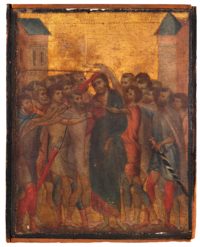 The panel painting by Cimabue that was found in an elderly woman’s kitchen outside Compiegne and sold at auction for $26.6 million in October won’t be leaving France anytime soon. Minister of Culture Franck Riester has refused to issue an export certificate the buyers. Now France has 30 months to scrape up the hefty sum necessary to claim the masterpiece for the national collections.
The panel painting by Cimabue that was found in an elderly woman’s kitchen outside Compiegne and sold at auction for $26.6 million in October won’t be leaving France anytime soon. Minister of Culture Franck Riester has refused to issue an export certificate the buyers. Now France has 30 months to scrape up the hefty sum necessary to claim the masterpiece for the national collections.
Christ Mocked is a 10-inch panel painted by the late medieval pioneer Cenni di Pepo, aka Cimabue, in around 1280 as part of an altarpiece diptych. Two other panels believed to be part of the altarpiece are in the Frick Collection in New York and National Gallery, London. The three panels share significant detail — the architecture, the gold background, the rich pigments and the design of the halos — and the poplar plank serving as a support to Christ Mocked and the National Gallery’s panel matches precisely. They were once a single continuous piece.
With only 11 other Cimabue works known to exist, all of them in museums, the bidding for this panel was hot, to say the least. The Acteon auction house did not reveal the buyer’s identity, but it did obliquely refer to a “foreign museum” having been among the bidders. That turns out to have been the Metropolitan Museum of Art, which, despite its copious funding, was only the second-to-last man standing. The Met lost out to the Alana collection, a private collection of Italian Renaissance art based in the United States. It applied for an export license that was denied on Monday, December 23rd.
Following the opinion of the Advisory Committee on National Treasures, the Minister of Culture signed the decree refusing the export certificate last December for this rare panel, thus conferring on it the status of national treasure for a period thirty months which will start from the notification of this decision to the owner of the painting. This period will be used to raise the funds necessary to carry out an acquisition for the benefit of public national collections in order to allow this panel to join the Maesta of the Italian master already kept at the Louvre museum.
“I salute the eminent role played by the export control system for cultural goods for the protection and enrichment of the national heritage and I thank the members of the Advisory Committee on National Treasures, under the leadership of its chairman, Edmond Honorat, whose careful examination of the certificate refusal proposals clarifies my decisions. Thanks to the time given by this measure, all efforts can be mobilized so that this exceptional work can enrich national collections,” declared Franck Riester.